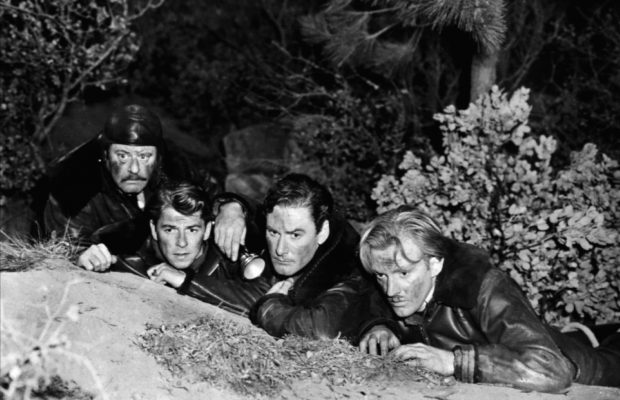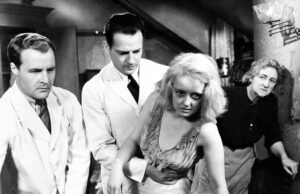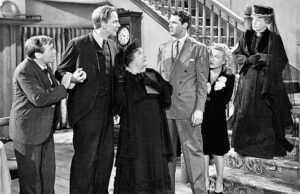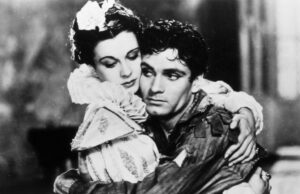Desperate Journey (1942)

Toronto Film Society presented Desperate Journey (1942) on Monday, April 28, 1980 in a double bill with Knock on Wood as part of the Season 32 Monday Evening Film Buff Series, Programme 9.
Production Company: Warner Brothers. Director: Raoul Walsh. Executive Producer: Hal B. Wallis. Associate Producer: Jack Saper. Original Screenplay: Arthur T. Horman. Music: Max Steiner. Director of Photography: Bert Glennon. Dialogue Director: Hugh MacMullan. Film Editor: Rudi Fehr. Art Director: Carl Jules Weyl. Sound: C.A. Riggs. Gowns: Milo Anderson. Makeup: Perc Westmore. Special Effects: Edwin DuPar. Orchestrations: Hugo Friedhofer. Assistant Director: Russell Saunders. Technical Advisor on RAF Sequences: S/L O. Cathcart-Jones, RCAF.
Cast: Errol Flynn (Flt Lieut Terence Forbes), Ronald Reagan (F/O Johnny Hammond), Nancy Coleman (Kaethe Brahms), Raymond Massey (Major Otto Baumeister), Alan Hale (F/S Kirk Edwards), Arthur Kennedy (F/O Jed Forrest), Ronald Sinclair (F/S Lloyd Hollis), Albert Basserman (Dr. Mather), Sig Rumann (Preuss), Patrick O’Moore (S/L Lane Ferris), Felix Basch (Dr. Herman Brahms), Ilka Gruning (Frau Brahms), Elsa Basserman (Frau Raeder), Charles Irwin (Captain Coswick), Richard Fraser (S/L Clark), Robert O. Davis (Kruse), Henry Victor (Heinrich Schwartzmuller), Bruce Lester (Asst. Plotting Officer), Lester Matthews (Wing Commander), Kurt Katch (Hesse), Hans Schumm (Gestapo), Helmut Dantine (German Co-Pilot), Barry Bernard (S/Commander).
The USA’s entry into World War II found Warner Brothers (and all other Hollywood studios) geared for action and more than eager to exhort the American public to patriotic zeal and an unswerving determination to achieve victory. During the next four years hundreds of films were produced detailing the conflict on land, sea, and in the air. These wartime films had an immediacy, an urgency about them, particularly noticeable in tonight’s film.
Of all Hollywood studios, Warner Bros. had the “style” which best suited the action war film. Since the early 30’s the Burbank studio had released hundreds of films characterized by fast pacing, superb high-key black and white photography, stirring musical scores and stories never short on action, such as Bullets or Ballots, San Quentin, Angels With Dirty Faces, Captain Blood and The Roaring Twenties.
Desperate Journey makes ample use of the technical resources of Warners and of the abilities of Raoul Walsh, a very competent action director. He and Flynn worked well together in films such as They Died With Their Boots On and Gentleman Jim, and were close friends. The film tells the story of the crew of an RAF bomber shot down after a raid over Germany, and their attempts to get back to England. Flynn is at his breeziest as a reckless Australian flyer; Ronald Reagan (the man who would be President) as an American; Arthur Kennedy as a Canadian; Alan Hale a his usual boisterous self. Toronto’s Raymond Massey plays a German Major with scenery-chewing relish. Hairbreadth escapes, surprise plot twists and nerve-wracking tension are superbly accentuated by Max Steiner’s magnificent score. At not time does the story falter.
Flynn has presence as the main character, although a hint of hesitation seems to show in his acting. In contrast Reagan, with his radio-trained voice is steady and self assured. The film is well photographed and edited. The montage scene of the bomber taking off is a masterpiece.
In recent years writers have attempted to discredit wartime films as crude, racist propaganda. These people can have no grasp of the context in which these films were made. The democracies were locked in mortal combat with a tough and ruthless enemy who would have destroyed our civilization had we lost the war. World War II films did not glorify war as such, rather they showed brave men and women fighting and dying for something they believed in–freedom. Let’s enjoy Desperate Journey for what it is–a skillfully made, exciting film. As the lights go down and the curtains rise, we’re in for a thrilling evening.
Notes by John Thompson












Leave a Reply